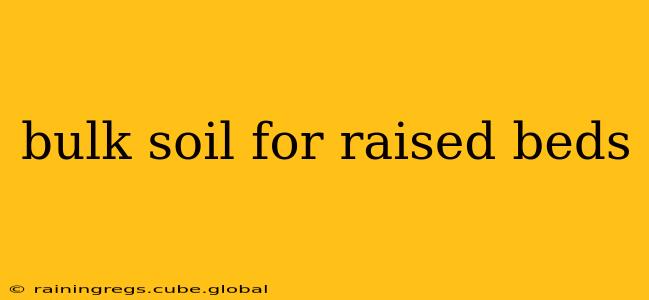Creating thriving raised bed gardens requires more than just tossing some dirt in a box. The success of your plants hinges heavily on the quality and composition of your soil. Choosing the right bulk soil for your raised beds is crucial for healthy growth and bountiful harvests. This comprehensive guide will walk you through everything you need to know to select the perfect soil blend for your gardening needs.
What are the benefits of using bulk soil for raised beds?
Using bulk soil offers several advantages over buying smaller bags. Firstly, cost-effectiveness: Purchasing in bulk significantly reduces the price per cubic foot, making it a more budget-friendly option for larger raised bed projects. Secondly, convenience: Having a large quantity delivered saves you countless trips to the garden center, saving you time and effort. Finally, consistent quality: Bulk soil often provides a more consistent blend compared to smaller bags, which can sometimes vary in composition.
What type of soil is best for raised garden beds?
The ideal soil type for raised beds is a well-draining, nutrient-rich mix. This typically involves a blend of several components. A good starting point is a combination of:
- Compost: This provides essential nutrients and improves soil structure, leading to better aeration and water retention.
- Topsoil: This provides a foundation of minerals and organic matter.
- Other Amendments: Depending on your specific needs, you might add peat moss (for water retention), perlite or vermiculite (for drainage and aeration), or aged manure (for added nutrients).
The exact ratio will depend on your local soil conditions and the plants you intend to grow. Heavier clay soils will benefit from more perlite or vermiculite, while sandy soils might need more compost and peat moss.
What are the different types of bulk soil available?
Several types of bulk soil are available, each with its own characteristics:
- Topsoil: The most common type, topsoil contains a mix of minerals, organic matter, and microorganisms. However, it can sometimes be heavy and poorly drained.
- Garden Soil: A blend of topsoil, compost, and other amendments designed specifically for gardening. This is often a good all-around choice for raised beds.
- Potting Mix: Lighter and airier than garden soil, potting mix is ideal for container gardening and can be added to raised beds to improve drainage and aeration. However, it's generally lower in nutrients and requires regular fertilization.
- Custom Soil Blends: Many suppliers offer custom soil blends tailored to specific plant needs or soil conditions. This is an excellent option for experienced gardeners who have precise requirements.
How much bulk soil do I need for my raised beds?
Calculating the amount of soil needed depends on the dimensions of your raised beds. Measure the length, width, and depth of each bed and multiply them together to find the cubic volume. Remember to account for the settling of the soil after filling; you may need slightly more than your initial calculations suggest.
Where can I buy bulk soil for raised beds?
Bulk soil can be purchased from various sources:
- Local garden centers: Many garden centers sell bulk soil, offering delivery services.
- Landscape supply companies: These companies usually offer a wider variety of soil types and larger quantities at competitive prices.
- Online retailers: Several online retailers sell and deliver bulk soil, providing a convenient option for those with limited transportation.
Is it better to make my own soil mix or buy bulk soil?
This depends on your experience level, the scale of your project, and the availability of materials. Making your own soil mix can be rewarding, but it requires research and access to the necessary components. Buying bulk soil is often more convenient and efficient, especially for larger projects.
What are the important things to consider when buying bulk soil?
Before purchasing, consider the following:
- Soil composition: Check the ingredients to ensure it meets your needs.
- Quality: Look for reputable suppliers with high-quality products.
- Delivery: Inquire about delivery options and costs, especially if you need large quantities.
- Price: Compare prices from different suppliers to find the best deal.
- Testing: Consider having your soil tested to determine its nutrient levels and pH before planting.
By carefully considering these factors and understanding the different types of bulk soil available, you can create a thriving raised bed garden that will bring joy and abundance for years to come. Remember, selecting the right soil is a fundamental step towards successful gardening.
